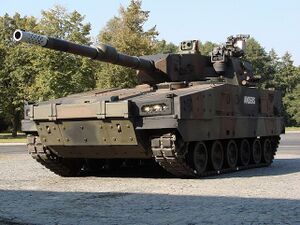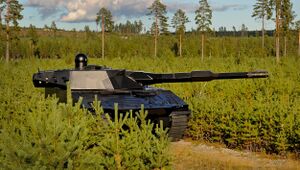Ikv-121: Difference between revisions
(Created page with "{{infobox weapon | name = Infantrikannonvagon 121<br><small>Ikv-121</small> | image = 300px | caption = A Ikv-121B o...") |
No edit summary |
||
| (One intermediate revision by the same user not shown) | |||
| Line 113: | Line 113: | ||
====Weapons Systems==== | ====Weapons Systems==== | ||
The Ikv-121 is armed with an L/48 120mm M/1022 smoothbore rifle built by Husqvarna Vappenfabrik, based on the m/1021 L/44 120mm gun. With an overall length of 5,780cm and a weight of 1,270kg, the cannon utilizes a unique 3-chamber muzzle device to reduce recoil impulse by 26.5 percent over the parent design. Capable of firing the full compartment of 120mm ammunition, the m/1022 gives the Ikv-121 the ability to engage a full range of targets typical of MBTs. The bore evacuator and the gun's thermal sleeve, designed to regulate the temperature of the barrel, are made of glass-reinforced plastic, while the barrel has a chromemolly lining to increase barrel life; the barrel has a life of some 2,000 rounds of full charged ammunition, and is stabilized by a multi-plane stabilization system mated to the Okrug-6 Fire control computer, which includes cross wind sensors, Kestrel-8 meteorological stations, and laser rangefinders. Maximum chamber pressure is 580MPa. | The Ikv-121 is armed with an L/48 120mm M/1022 smoothbore rifle built by Husqvarna Vappenfabrik, based on the m/1021 L/44 120mm gun. With an overall length of 5,780cm and a weight of 1,270kg, the cannon utilizes a unique 3-chamber muzzle device to reduce recoil impulse by 26.5 percent over the parent design. Capable of firing the full compartment of 120mm ammunition, the m/1022 gives the Ikv-121 the ability to engage a full range of targets typical of MBTs. The bore evacuator and the gun's thermal sleeve, designed to regulate the temperature of the barrel, are made of glass-reinforced plastic, while the barrel has a chromemolly lining to increase barrel life; the barrel has a life of some 2,000 rounds of full charged ammunition, and is stabilized by a multi-plane stabilization system mated to the Okrug-6 Fire control computer, which includes cross wind sensors, Kestrel-8 meteorological stations, and laser rangefinders. Maximum chamber pressure is 580MPa. | ||
[[File:Ikv-121EU.jpg|Right||thumb|An IkV-121G on patrol in northern Gottsvand, 2017]] | |||
In addition to the main gun, the Ikv-121B and forward fit all standard RWS systems; most typically this is a 14.5x114mm Machine Gun, M26 25x59mm Grenade launcher, or 40x53mm grenade launcher. The coaxal machine gun is a 7.5x65mm Bksp m/34TE. In the Ikv-122A, a driver's machine gun, a 5.65mm Ksp-78 with 500 rounds was present; it is unclear if this station still remains. 12 76mm smoke dischargers are present, and a Santronic ITID-S softkill munition system has been standard since 2006. | In addition to the main gun, the Ikv-121B and forward fit all standard RWS systems; most typically this is a 14.5x114mm Machine Gun, M26 25x59mm Grenade launcher, or 40x53mm grenade launcher. The coaxal machine gun is a 7.5x65mm Bksp m/34TE. In the Ikv-122A, a driver's machine gun, a 5.65mm Ksp-78 with 500 rounds was present; it is unclear if this station still remains. 12 76mm smoke dischargers are present, and a Santronic ITID-S softkill munition system has been standard since 2006. | ||
| Line 124: | Line 124: | ||
{{Flag|Dniegua}} | {{Flag|Dniegua}} | ||
*Dnieguan Armed Forces | *Dnieguan Armed Forces | ||
[[Category:Dniegua]] | |||
Latest revision as of 02:45, 14 June 2019
| Infantrikannonvagon 121 Ikv-121 | |
|---|---|
 A Ikv-121B of the Dnieguan Army | |
| Type | Light Tank Tank Destroyer |
| Place of origin | Dniegua |
| Service history | |
| In service | 2006 |
| Used by | Dniegua |
| Production history | |
| Designer | Hägglunds Maschina |
| Designed | 1994 |
| Manufacturer | Hägglunds Mascinfabrik |
| Unit cost | $4,622,000 Kroner (About $3,152,000USD) |
| Produced | Since 2004 |
| Specifications | |
| Weight | 35,125 kilos (121A and B) 36,850 kilos (C) 39,000 kilos (U) |
| Length | 6.9m |
| Width | 3.3 m |
| Height | 2.8m |
| Crew | 3 (Driver, Gunner, Commander in hull) Four dismounts in rear troop compartment |
| Armor | Laminated steel/composite mixture, with additional armor packages for increased survivability 60mm at 42 degree obliquity (Front) |
Main armament | x1 Husqvarna Vappenfabrik 12cm L/44 M/1022 Gun |
Secondary armament | 6.5mm Machine Gun (Coax)
Roof mount of 14.5mm Machine Gun or 25mm M/26T 12 smoke dischargers |
| Engine | Skab-Volvo 8 Cylinder 7085-RDD3 Turbochaged 16 liter engine developing 600kW (816hp) and 3000nM (2212hp) of Torque |
| Power/weight | 23hp/tonne |
| Transmission | Automatic with five forward and two reverse gears |
| Suspension | hydropneumatic |
Operational range | 620 km |
| Speed | 86 km/h (55mph) |
The Ikv-121 is a Light Tank/Heavy Infantry Fighting Vehicle currently in use by the Military of Dniegua. Armed with a 12cm High-pressure cannon, the Ikv-121 fulfills the role of infantry fire support for light and mechanized units, where its sub-40 tonne weight allows it to be transported by landing craft; principally employed by the Dnieguan Naval Infantry. The Ikv-121 is based upon the family of Medium Armored Vehicles chassis, using the engine, suspension, and same general hull layout as Dnieguas primary Infantry Fighting Vehicle. Usually seen as an attache to Mechanized units, the Ikv-121 carries ATGM teams, Reconnaissance troops, and special mission teams in Dnieguan military service. The Gunner, Commander and Driver are seated in the hull, which uses a front mounted engine, while the unamnned turret contains a bustle and carousel autoloader holding 20 and 26 rounds each. The rear of the vehicle can carry 4 fully-loaded infantrymen, or six lightly outfitted men.
Since its introduction in 2006, the Ikv-121 has been adopted by all of Dnieguas land-service branches, though it was originally a design for the Naval Infantry. The vehicle has seen continued service life upgrades, variations and modifications in Dnieguan service and abroad, where it has had marginal success. The ability to fit the vehicle with mission-specific armor, ranging from the chassis base all-around 12.7mm protection to up to 30mm APFS Protection, offers suitability for expeditionary forces of all types. To date, over 2,000 have been built.
History
The Ikv-121 was proposed with the initial concept of the Medium Armored Vehicle family to give infantry brigades, both armored and motorized, a lightweight, protected mobile firepower asset that was smaller than a Main Battle Tank, consumed less fuel and could keep pace with the main infantry forces longer. It was to be amphibious, have all-terrain capability, and have superior overland capability than main battle tanks, while being able to protect against the armament of typical infantry units, including grenades, rifles, machine guns and automatic cannons. The concept as scrapped with budgets constraints preventing more than three prototypes being built. The Dnieguan Military felt these overlapped in mission too greatly with the role of a Main Battle Tank, and, along with the Heavy Infantry Carrier, were scrapped.
Renewed interest from the Dnieguan Marines in 2003 renewed interest in the Ikv-121 concept. Feeling the need to replace the old Ikfv-93, a 90mm scout-tank pressed into service as a Assault gun, the Dnieguan Marines decided that using a common chassis with the Strf. 90 Infantry Fighting Vehicle was advantageous. Exploratory committees reassessed the early prototypes, and provided funding for a company of 12 pre-production vehicles to be built for testing. Testing proceeded at the proving grounds in Chavporkal for two years, eventually netting the vehicle as an approved Dnieguan Military variation of the Medium Armored Vehicle family, officially designating it as the Ikv-121. Initial deliveries took place in 2006 to Dnieguas Naval Infantry mechanized Brigades.
The Dnieguan army adopted the vehicle in 2008 and has since included them in the Company-level formation in its ORBAT for Mechanized forces.
Design
The Ikv-121 defies classical classification standards, being too light for a Main Battle Tank, who, today, routinely weigh in excess of 58 tonnes, but fits at the uppermost end of the Medium Chassis designed weight. The Ikv-121 lacks the armor of a Main Battle Tank, but provides a 120mm cannon able to fire the full compartment of 120mm shells, from APFS-DS to HEST, HEAT, and even ATGWs, and uses fire control systems from Main battle tanks. There are those that classify the Ikv-90 as a Tank Destroyer or an Assault Gun, though the Dnieguan Army officially classifies it as a Light Tank, while the Dnieguan Marines classify it as a Fire Support Vehicle.
Hull Design
The hull front is a wedged plate, consisting of an 8mm frontal plate of Rolled Homogeneous armor, spaced to a 61.5mm composite plate consisting of Strekolite thermosplastic sandwiched between layers of conventional armor, angled at 42 degrees. The sides armor measures 21.5mm thick and utilizes a titanium-steel alloy. Raer armor shares a similar armor scheme as the sides with doors measuring 8mm thick with spacing, and a second 5mm thick plate. The Turret is a small, narrow profile, unmanned design with protection from incoming fire in profile with the rest of the vehicle.
Suspension
Suspension is a typical torsion bar type, with 6 road wheels on a steel track, as is common on all of the Family of Medium Armor vehicles. It offers excellent overland capability. Unique to the Ikv-121 is a Mercury filled buffer tube system to absorb recoil of the 120mm gun.
Weapons Systems
The Ikv-121 is armed with an L/48 120mm M/1022 smoothbore rifle built by Husqvarna Vappenfabrik, based on the m/1021 L/44 120mm gun. With an overall length of 5,780cm and a weight of 1,270kg, the cannon utilizes a unique 3-chamber muzzle device to reduce recoil impulse by 26.5 percent over the parent design. Capable of firing the full compartment of 120mm ammunition, the m/1022 gives the Ikv-121 the ability to engage a full range of targets typical of MBTs. The bore evacuator and the gun's thermal sleeve, designed to regulate the temperature of the barrel, are made of glass-reinforced plastic, while the barrel has a chromemolly lining to increase barrel life; the barrel has a life of some 2,000 rounds of full charged ammunition, and is stabilized by a multi-plane stabilization system mated to the Okrug-6 Fire control computer, which includes cross wind sensors, Kestrel-8 meteorological stations, and laser rangefinders. Maximum chamber pressure is 580MPa.
In addition to the main gun, the Ikv-121B and forward fit all standard RWS systems; most typically this is a 14.5x114mm Machine Gun, M26 25x59mm Grenade launcher, or 40x53mm grenade launcher. The coaxal machine gun is a 7.5x65mm Bksp m/34TE. In the Ikv-122A, a driver's machine gun, a 5.65mm Ksp-78 with 500 rounds was present; it is unclear if this station still remains. 12 76mm smoke dischargers are present, and a Santronic ITID-S softkill munition system has been standard since 2006.
Powerpack
A 15,944 cubic Centimeter, 90 degree turbocharged diesel V8 designed and built by Volvo powers the Ikv-121. A 130/150mm bore/stroke engine with a 1,990cc displacement per piston, the liquid-cooled engine develops 3,000Nm of Torque at 1,500RpM and 600kW at 2,300 rpm, consuming 205 grames of fuel per Kilowatt Hour at 1,800 rpm. The engine sits fore of the vehicle, to the Right of the Driver. Measuring 1179x1067x963 millimeters,the dry mass of the engine is 1,272 kilograms, and is dry-stump oiled. This, mated to a 5-speed automatic transmission with two rearward running gears enables the Ikv-121 to travel along road surfaces at 86kmh. The vehicle has been remarked to have "extremely good" mobility.
Protection
Capable of protecting against 12.7x99mm at 100 meter and above with expanding armor options to defend against 30mm APFSDS at 500m. The armor protects crew and equipment against 155mm HE at 10 meters and above, and will protect against at least a 10kg mine detonated beneith the tracks.
Service History
Users
- Dnieguan Armed Forces
